More than 70 politicians, partners and community business representatives gathered at the Houses of Parliament this week for the launch of Plunkett UK’s flagship research report, Community Ownership: a Better Form of Business.
Ahead of the Autumn Budget, Plunkett UK called on support from government to ensure that community groups are able to save and take ownership of local assets, whilst highlighting how rural communities are too often overlooked.
“One of the challenges that Plunkett and rural communities have got at the moment is making sure that our voice is heard,” said Alison Jeffers, Chair of Trustees at Plunkett, as she formally welcomed guests to the event.
Alison continued, “I don’t think anybody could read this report and come away with any other conclusion apart from how great community businesses are and the value that they bring to communities. We should rename this report, so instead of a better form of business, how about the best form of business!”
Sponsored by Plunkett’s partners – Thakeham, Better Society Capital, Access – The Foundation for Social Investment, – the event offered an opportunity to explore the report’s key messages and Plunkett’s work through speeches, a panel discussion, and networking.
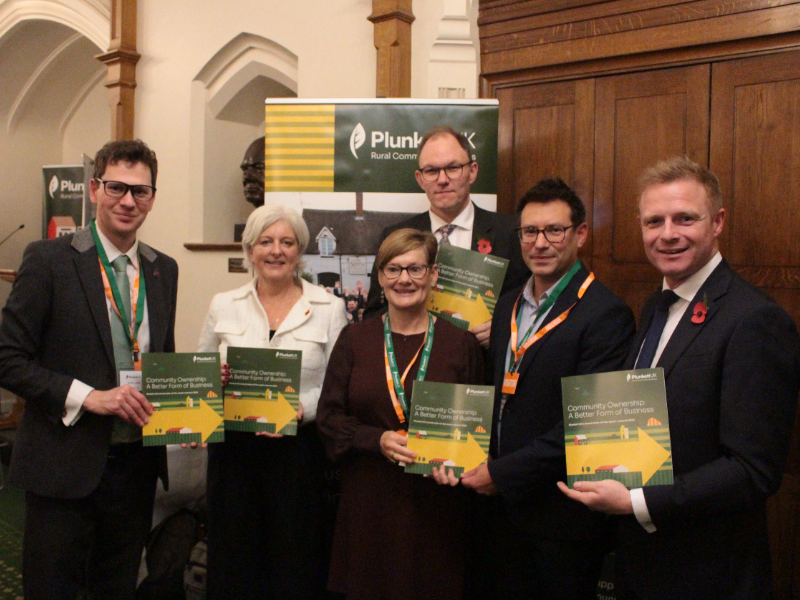
(from left to right) David Lydiat, Plunkett UK Head of External Affairs; Caroline Voaden, MP for South Devon; Alison Jeffers, Plunkett UK Chair of Trustees; Gareth Snell, MP for Stoke-on-Trent Central; James Alcock, Plunkett UK Chief Executive; Robbie Moore, MP for Keighley and Ilkley
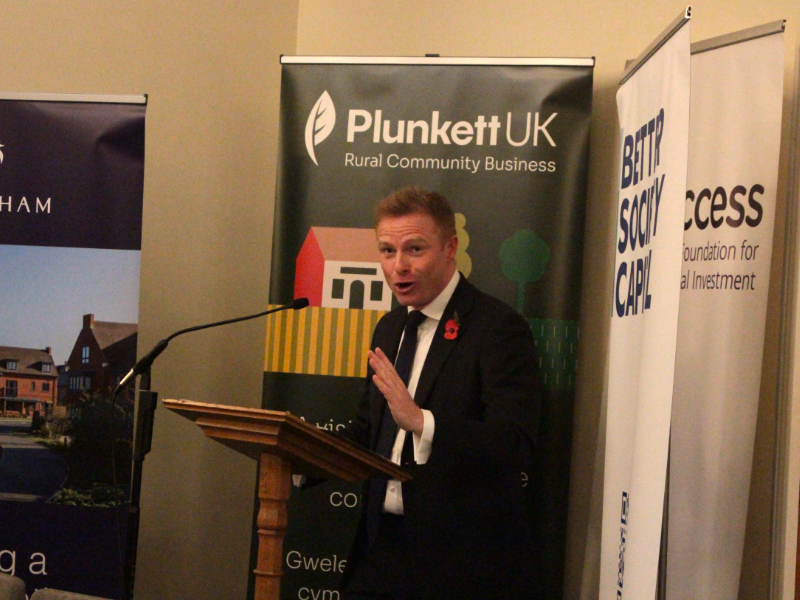
Robbie Moore MP addressing the room
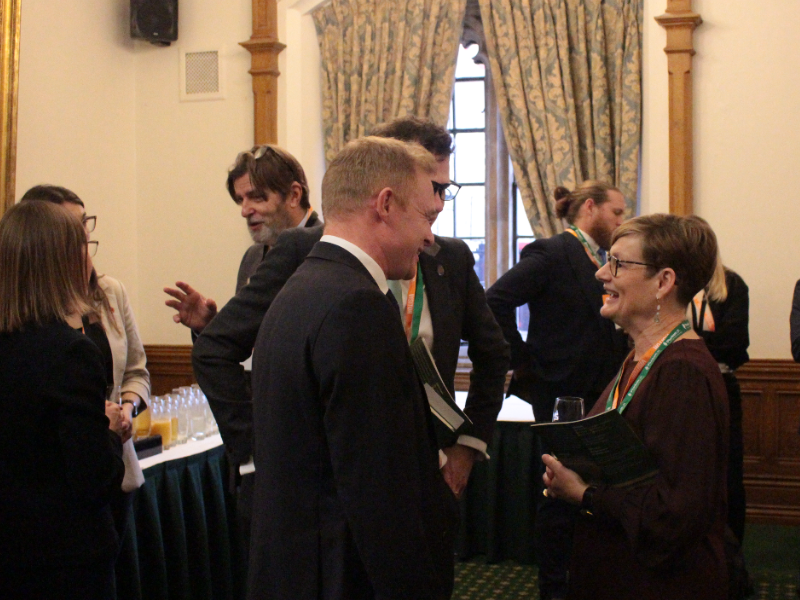
Robbie Moore MP with Plunkett’s Chair of Trustees, Alison Jeffers
The cornerstone of our rural economy
The host for the event was Robbie Moore, MP for Keighley and Ilkley in West Yorkshire and DEFRA Shadow Minister. He commended the report to MPs in the room, asking them to “sell it to others.”
“The absolute reality of it is, without the hard work that Plunkett UK members have put into not only producing this report, but doing a huge amount of outreach to many members of Parliament, the rural voice will not be at the heart of government thinking.
“We know that community ownership is a model that has made the impossible possible for many rural areas and kept services available that would otherwise have dried up.”
He paid tribute to East Morton Community Shop in his constituency and the volunteers there that “do an incredible job in providing a huge amount of outreach and level of service” – and thanked all the Plunkett community business members in the room for their commitment too.
Mr Moore recognised the many challenges related to finance and recruitment, especially of young people. “Signs do not look that great for our rural economy. We have already seen the rural service delivery grant cut and the government policy is not focused as much as it should be on those rural thriving communities.
He added, “I would absolutely like to see community-owned businesses in our rural areas be supported both with direct support and easier access to finance. We know local communities not only make them work, but go on to make them thrive and absolutely become the cornerstone of our rural economy.”
The report could be revolutionary
Also speaking to the report was Gareth Snell, MP for Stoke-on-Trent Central, and represents the Labour and the Co-operative Party. He said, “We know that community ownership gives people power over where they live. It allows people to take a stance about their own community. And community businesses often are more resilient, more long-standing, more equitable, because they are rooted in their communities, serving the people who use them. It is about the service that they provide, not the profit they derive.
“And that is one of the reasons why I was very proud that the government that we have now has made that big commitment to double the size of the cooperatives and mutual sector.”
Mr Snell spoke about the need to remove “stumbling blocks and hurdles” and how he hopes the Community Right to Buy would do that, which is currently passing through Parliament as part of the English Devolution and Community Empowerment Bill.
He said, “In the UN International Year of Cooperatives, we recognise that to build a better world, cooperatives have to be at the foundation. Your report, for me, is a key document to delivering that within this year.
“To those people that are going to lobby their MPs with this report, please make sure they read it and ask them questions about it – because genuinely what you are proposing in this report could be revolutionary for our rural communities and could be a huge boon to the cooperative movement in this country.”
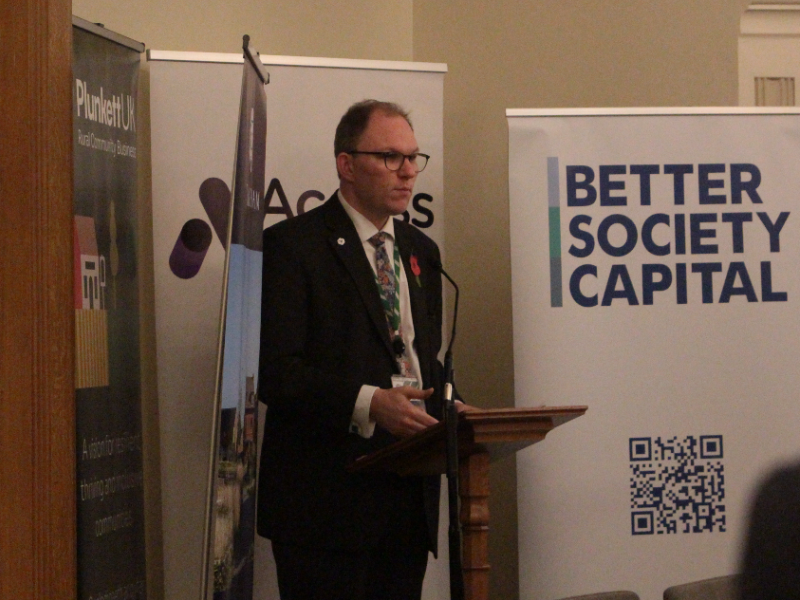
Gareth Snell MP gives his short talk reflecting on the report
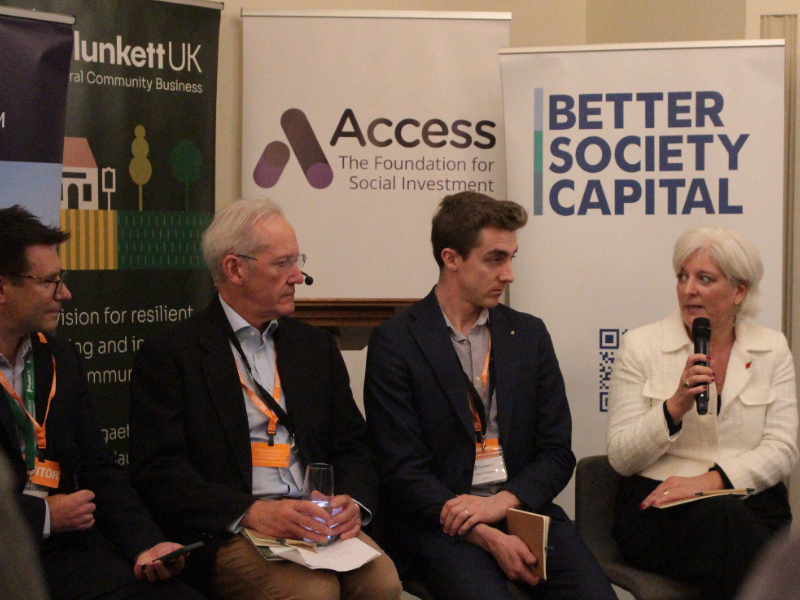
James Alcock, Plunkett’s Chief Executive; James Westhead, Head of Engagement at Better Society Capital; Tristan Robinson, Director of External Affairs and Social Value; and Caroline Voaden, MP for South Devon
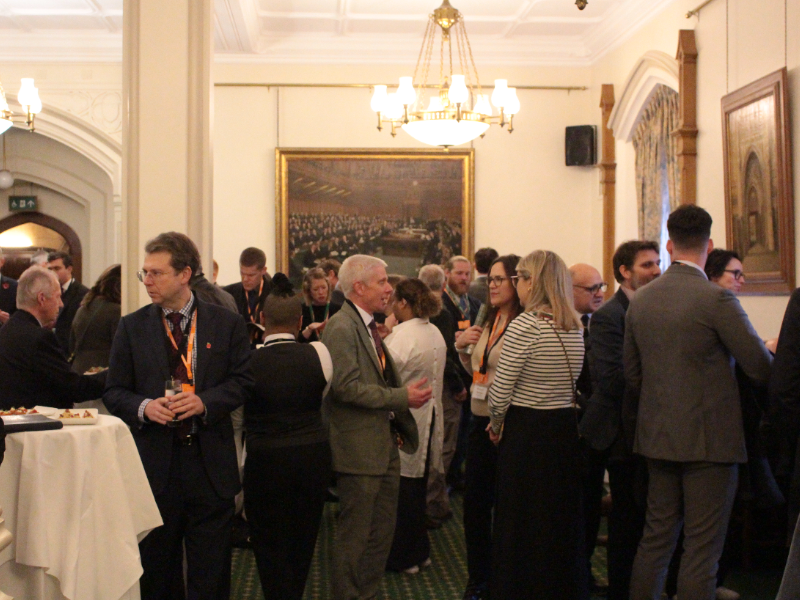
Guests in conversation at the launch event hosted in the Churchill Room at the Houses of Parliament
A story of hope
Further cross-party representation arrived in the panel discussion, with Liberal Democrats MP Caroline Voaden joining James Alcock (Plunkett’s Chief Executive), Tristan Robinson (Director of External Affairs and Social Value) and James Westhead (Head of Engagement at Better Society Capital).
James Alcock shared with guests some headline statistics from the report that focused on community business’ economy and the impressive five-year and long-term survival rates. James stated: “The report showcases a mixed picture; a success story – of economic and impact growth against the odds due to the community-ownership model – but one which also highlights the case that more government resources must reach rural areas.”
James said, “Through this report and the launch event today we are representing and listening to our members, and challenging policymakers at the highest level on their behalf. We will continue to do so until we see change.”
James added that, “community businesses are creating growth and impact – however this is being limited by stifling National Insurance, VAT and Business Rates, and worryingly, in some cases, are threatening the survival of community-owned businesses.”
A lack of direct funding is preventing community groups from being able to realise the dream of taking ownership and saving a local business or asset. Any Community Right to Buy legislation must help communities to succeed rather than being set up to fail.
Caroline Voaden focused on the social value they bring, which she has seen first-hand in her South Devon constituency. She said, “It’s difficult to call it a community if it’s just a bunch of homes. Community businesses are creating communities; their impact is transformational and can’t be measured.”
“Rural Britain is forgotten about and not a priority for government, with a lack of rural representation in the current cabinet. A community ownership fund needs reopening, which is something I have asked for.”
She urged community business members to be active in creating positive messaging around what they are doing. “There is a lack of hope across the country at the moment. We need to be a story of hope with examples of good practice.”
James Westhead acknowledged that many rural communities are not getting the funding they should be and said Better Society Capital and Access were looking at how they “could do better and could do more”. He said, “We know we need more flexibility and creativity, and could be a lot smarter about how investment is used.”
Tristan Robinson spoke about Thakeham’s trailblazing partnership with Plunkett in successfully creating a community shop at the Woodgate development in West Sussex, and said there were more opportunities for community businesses to be embedded in new house developments across the UK in future.
The government has pledged to build 1.5 million new houses over the next four years and Tristan underlined the human aspect of this. “It is 1.5 million homes that are needed, not just units. People want to live somewhere with a shop and a pub. Developers are looking to build 20 to 30 homes onto existing villages and we have to consult with who is already living there – what is in it for the village?”
A voice for community businesses
Among the people representing community businesses at the event was Steve Bridgewater from the community pub, Menter Y Ring in Llanfrothen, North Wales, a Plunkett member which only began trading in September 2025.
He said, “Plunkett have been fantastic to us as an organisation and just coming here to Parliament is an opportunity to meet people who have done what we’re doing now a lot longer: to pick their brains and to really harvest those good ideas and put them into action.”
Also in attendance were Melissa Cooper and Helen Seacole from Westbury Community Shop in Northamptonshire, which started almost ten years ago.
They said, “We are here today because it’s really important to know that there’s somebody here with the voice for us. It’s a struggle nowadays with costs. But knowing that other people are saying the right things in terms of support, then hopefully that will filter down to us on the ground level.”
Read more and get in touch
We will use the research findings to continue to advocate for change and better funding, and to ensure the voice of our members, is heard.
If you have any questions or comments arising from the report that can further strengthen our policy discussions, please do get in touch with us.





